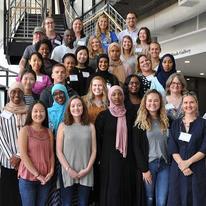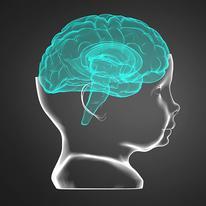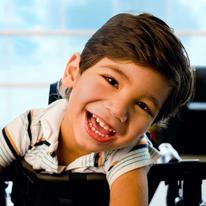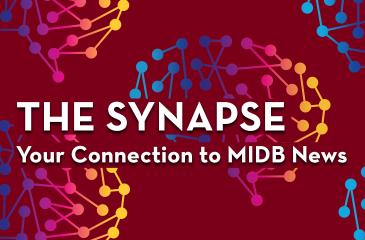The Synapse: July 2021
Integrating Clinical Care Needs Into Research

The most exciting part of supporting MIDB is to help build a world class platform where research can intersect with clinical care—helping us to improve our care and increase our impact on the communities we serve. Additionally, our research will be driven by the questions and concerns that matter most to our patients under our clinical care. This mix of research and quick integration into clinic application is a true differentiator from other care systems in our state.
The teams who will be providing care at MIDB are top providers who have interest in both research and clinical care, coming together from three distinct service lines—neuro, pediatrics and psychiatry—to offer innovative, comprehensive groundbreaking treatment and interventions. Together we are working with the research arm of MIDB to create and implement the most effective approaches as we keep an open mind to continuous improvements and new interventions.
Clinicians at MIDB will benefit from being able to integrate research-backed new approaches continuously. In turn, our patients and families can benefit from the newest, most recent changes to the care approach, ensuring state-of-the-art treatment and intervention models and outcomes.
We are so excited to continue to partner with you to build a model within MIDB that other academic research and clinical operators can emulate and build from.
Thank you,
Beth Heinz, MD, MSW, MHA
Allison Holt, MD

MNLEND Receives $3.56M to Continue Interdisciplinary Fellowships
Each year since 2008, the Minnesota Leadership Education in Neurodevelopmental and Related Disabilities (MNLEND) program at the Institute on Community Integration has brought together a cohort of graduate students and community trainees from more than 14 disciplines dedicated to improving the health and wellbeing of children, adolescents, and young adults who have or are at risk of developing autism spectrum disorder or other neurodevelopmental disabilities. MNLEND recently was awarded $3.56 million over the next five years from the Health Resources and Services Administration of the U.S. Department of Health and Human Services to continue its interdisciplinary fellowships. The University of Minnesota is supplementing the award with $864,480 in matching funds, as well as providing space for the program in the new Masonic Institute for the Developing Brain facility, which will provide new collaborative opportunities for MNLEND fellows, including a new TeleOutreach lab and teaching facilities.

Using Choline to Help Treat Children with FASD
Jeffrey Wozniak, PhD, LP, created a choline-based vitamin treatment to help enhance brain development in children with fetal alcohol spectrum disorders (FASD). His research randomized a group of children ages two through five years old, with one half receiving the choline nutrient and the other half receiving a placebo. Wozniak and his team discovered that children receiving the choline nutrient showed improvement in nonverbal intelligence such as visual problem-solving, thinking, attention, concentration and memory. “Children with FASD have very high rates of ADHD, and the group that received this treatment had lower levels of ADHD symptoms by the time we followed up with them four years later,” Wozniak said. To further their research findings, Wozniak and his team are currently taking MRIs of the brains of children with FASD and measuring what is happening physically to the brain after these children take the choline supplement for the current period of nine months and then have their follow up appointment four years later. They hope to expand the study with a continuation of the long-term follow-up and testing two new dose regimens in a new cohort. Read more about this choline research.

Bernstein/Davis Family Reception Area
Gail A. Bernstein, MD, is a long-time advocate for children's mental health and has spent her career providing clinical care and doing research in this area. So when the opportunity arose to provide the support necessary to help make MIDB a reality, it really spoke to her and her family. "We selected the option to name the waiting room space in part because it would reach so many people and honor our family's commitment to pediatric and adolescent mental health," said Bernstein. In addition to working as a child and adolescent psychiatrist in the Department of Psychiatry and Behavioral Sciences treating kids with anxiety and mood disorders, Bernstein is an active member of the MIDB planning committee and recently reviewed the aesthetics in the new facility to ensure they are family- and patient-friendly.

Starting Early to Manage Toxic Stress
The Birth-to-Three Clinic at the Masonic Institute for the Developing Brain will provide greater access to the U’s pioneering program for children with histories of toxic stress, which can stem from experiencing high levels of adversity. Stressors may include chronic illness, high risk to safety and wellbeing, and parents who are struggling with stress themselves. Toxic stress can lead to developmental and behavioral difficulties such as emotional issues, aggressiveness and impulsivity, sleep problems, and challenges in language or socialization. The Birth-to-Three Clinic—led by pediatric psychologist Maria Kroupina, PhD, LP, and her team—helps patients and families reverse the damaging effects of toxic stress and prevent further negative consequences. Specialists at the clinic evaluate mental health, assess social-emotional progress, and establish comprehensive plans to meet each child’s needs, providing early intervention that can lead to lifelong improvements in developmental health

ICI Teams Up with the Special Olympics
Deepening the Institute on Community Integration’s partnerships with Special Olympics organizations, Renáta Tichá, PhD, and Brian Abery, PhD, recently began creating a screening tool for developmental milestones that will eventually be incorporated into Special Olympics sites around the world. Another project will evaluate social and educational inclusion programs for secondary school students in Minnesota. This partnership provides a meaningful synergy between ICI's expertise in measure and curriculum development and evaluation as well as a longstanding and well-recognized Special Olympics movement in supporting the health and wellbeing of individuals with intellectual and/or developmental disabilities locally, nationally, and internationally. Learn more about these partnerships.

Measuring and Enhancing Creativity and Brain Flexibility in Adolescents with Depression
An interdisciplinary team led by Kathryn Cullen, MD, has received a 2021 Minnesota Futures Award for their study on whether deep engagement in creative activities may benefit adolescents with depression by introducing a more flexible way of thinking, helping them to recognize and foster their own creative talents and ultimately develop more positive views of themselves and their futures. The project will provide the basis for a transformative research program to address a serious societal problem using novel intervention and measurement methodologies. Meanwhile, the project will advance understanding of the mechanisms underlying depression, recovery, and creativity development in adolescents. Learn more about this study.




